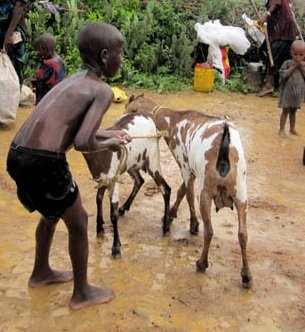
Farming and pastoralist families in northern Somalia’s Bari are struggling to rebuild their lives following destructive rainstorms that hit parts of the region at the end of last year.
Ayan Mohamed Mohamud, a pastoralist, told Radio Ergo she lost 338 goats in a single day of continuous rainfall on 31 December 2022. The goats were already weak from the drought and unable to survive the sudden cold.
She has taken essential food items including flour, rice and sugar on credit to feed her family, but is worried what she will do when the 10-day supply finishes.
“The family depended on the livestock. We can’t even afford milk for the children now. The younger children who used to drink the milk are just crying. Our family was in a good position before but now we have nothing,” said the mother of seven living in Haabo, Alula district.
Describing the panic she felt as the storm raged, she said: “I thought of taking the goats to higher ground to shelter in a cave, but the rainfall was so heavy and there were very strong winds. The rain and cold killed them.”
Only 10 of her goats survived and they are weak. She had been planning to sell three of them to buy food. They are down to one meal a day and have no savings to recover.
“I don’t have any wealth or anything in store. Our family doesn’t have any property in town. We don’t have a shilling to buy anything,” she said.
Farmers like Mohamed Said Mohamud were also affected by the storm. He lost all the tomatoes, onions, watermelons, pepper, capsicum, sorghum and maize that he planted last October on his two-hectare farm in Haabo.
The crops that he had been expecting to harvest in February were washed away by flood water rushing down from higher ground. Now they have food left to last a month and afterwards will have to ask relatives for help.
“We don’t have money – we can only look for loans, but we don’t have any savings. I was supporting my family on my earnings from the farm,” he said in despair.
Mohamed invested in the farm in 2022 with $5,000 he saved from his previous livelihood as a fisherman. He gave up fishing after coming under attack by foreign trawlers destroying their boats and fishing gear.
The regional commissioner, Muse Salah Guled, said that Baargal, Baredo and Alula were the worst hit areas. He noted that his administration was trying to assist the families to recover. The local authorities estimated that more than 1,000 animals including goats and camels had perished, while 31 farms were washed away.
Bari region has been facing prolonged drought that left people struggling for water and grazing for their animals. The water catchment areas have been replenished after the heavy downpours.
Source: Radio Ergo


Leave a Reply